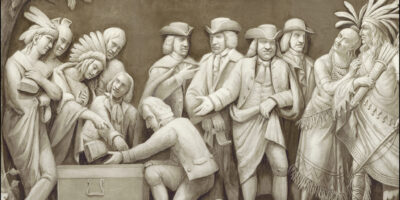Liberty and the Search for Meaning
Let me propose a question to you. What is the strongest objection to the idea of liberty, markets, and a self-managing society? We’ve been subjected to vast numbers of them recently. Which is most compelling?
Some people say the key objection is the problem of inequality. In a free society, there will always be unequal outcomes, and even unequal opportunities. Human experience eludes identification with mathematical equations. Some people can’t tolerate that. They want social upheaval to end it.
Others say that markets deal insufficiently with accidents of birth. Being the product of a family with assets in a beautiful, peaceful town, with great educational opportunities, naturally grants certain life advantages relative to those born into poverty and raised in a world of crime and ignorance. Freedom, they say, doesn’t deal well with this. My problem with this idea is that no system apart from freedom has successfully dealt with it; certainly, any state-managed system only ends in exacerbating and entrenching accidents of birth.
You can multiply these objections, most completely baseless, without limit: monopoly, economic instability, public goods, greed, the poor, streets, you name it. In times when we are experiencing the beautiful productivity of markets more than ever before, we are being bombarded by unending attacks on the whole idea.
What Does It Mean?
My own opinion on the top objection to liberalism, classically understood, concerns something a bit more opaque and philosophical. People say that the idea of freedom does not do well to address the great human problem of the search for meaning. This has historically been the most politically effective critique. The opponents of liberalism have long derided the market society as pointlessly consumerist, nihilistically materialistic, and hopelessly mired in moral emptiness.
Freedom is not a system that gives our lives meaning, they say; in fact, freedom distracts us from finding meaning. Trading, working, accumulating, investment, acquiring nicer toys, getting along ever better with others, living in a better home, raising a family, carving out ever more pleasurable forms of leisure – what is the point of all this? This path of life is too linear, too predictable, too undramatic, too boring!
The two most effective assaults on bourgeois liberalism have followed this script. Karl Marx posited in the 19th century that this system was inherently reactionary because it failed to come to terms with the dialectic of history which, he said, was inexorably leading to socialism – via some huge class struggle – and eventually communism in which property, family, religion, class, wages, capital, and so on, would be rendered obsolete. His vision was compelling because it infused the passage of time with direction and purpose, whereas the market society is only about living a better life within the world as it is given to us. His solution was a mighty struggle against capital and a dictatorship of the proletariat as led by a vanguard in charge of the state apparatus so long as is necessary.
A different spin on this theme came in the 20th century with the work of Carl Schmitt, whose works are experiencing a huge academic resurgence today. It is said that he was the most effective critic of liberalism in the 20th century (and never mind that he was a Nazi). His main point is that the life of trading, peace, and prosperity is lacking in anything epically meaningful. The glorious classical virtues include bravery, being part of something giant, participating in the seismic shifts of history. None of this is possible with liberalism.
Schmitt heaped unrelenting disgust on the idea of merely getting along with others and getting more stuff. He demands to know: what could life possible mean under these conditions? Just getting along with others, as liberalism suggests? No, no, this approach will utterly deracinate you from your identity, whether religious, racial, sexual, linguistic, or ancestral. What you need for meaning is some sense of attachment to something larger – larger than your life and larger than your times. You need a struggle, and an agent to represent you in this struggle.
These days, most critiques of freedom from the left and the right do not achieve much more than riffing on these Marxian and Schmittian themes. Choose your critique; it all comes down to the dreariness of life under liberalism. The opponents of liberalism demand that we drop all this bourgeois nonsense about just getting along with people and instead engage the dialectic of history as real players, ushering in the new age of you name it.
Note the similarities between the same proposition for a new sense of meaning. Both insist that meaning involves something outside your own mind and experience. You cannot define it for yourself. Meaning is made operational by virtue of your attachment to the collective, which is why this critique always devolves to populist forms of political organizing. But reality also dictates that a collective cannot truly act or think; it will always be fractured into parts. The champions of collectivism decry this as social division, fracturing, a society rendered into parts. This is true on the left and right, and they see it this way because their imagined ideal society is always about groups on the move in the context of a grand struggle; this is what gives life meaning.
The Machinery of False Meaning
And what represents this great collective? For both the left and right, the answer is obvious. It is the state. Only the state has a plausible claim to represent the purposes of the collective. Both socialism and nationalism depend on this idea. Donald Trump stated the point directly: “The nation-state remains the true foundation for happiness and harmony.” Alexandria Ocasio-Cortez echoes the same themes with her call for “a new national social, industrial and economic mobilization on a scale not seen since World War II and the New Deal.”
Others on the religious right are pushing the same theme: Daniel McCarthy has written for First Things a sweeping rejection of economic liberalism and a call for it to be replaced by “refocusing on the American citizen as the basic unit of the economy. This is the essence of a nationalist political economy,” failing to consider that economy itself is not about forced collectives but rather human choice. And the now-famous rant by Tucker Carlson echoes the same theme, thoroughly putting down the idea of letting society evolve on its own without decisive direction from the center.
What’s behind all this is, of course, the struggle to control the direction of the monstrous, wealthy, and powerful federal government in the interest of the particular desires of intellectuals and politicians. The intellectuals and pundits who put down the idea of freedom as inherently meaningless are, unwittingly or not, feeding the politicization of society and the beast that benefits from collectivist ideology. Neither side will finally win; the struggle to control the state will never end and the rest of us will be caught in the crossfire.
Meaning within Freedom Itself
There is another school of thought that sees freedom as completely barren of meaning in itself, an empty vessel that we must fill on our own. I see the point here, but it seems to disparage the meaningful component part of freedom such as individual rights, the opportunity to live a better life, the incentive and need for human cooperation, the resulting prosperity that comes from trading, the courage that it requires to be entrepreneurial in the face of an uncertain future, the opportunity to create something new. These are all meaningful things, even virtuous things, and they flow from the opportunity and energy that freedom provides. The state cannot provide a substitute.
And this is the point that the statism of meaning always overlooks: every state action, every program, every nationalized priority, every vision of what we are supposed to be doing together that depends on some form of enforcement, all comes down the same thing: the imposition of violence. There is no true access to genuine meaning at the point of a gun; meaning is replaced by fear and compliance.
The kernel of truth in the idea that freedom is an empty vessel is this: meaning is individual. It flows from the individual heart, mind, and soul. That does not mean it is disconnected from others. Our communities do indeed have the most profound impact on our perceptions of whether we are living good and valuable lives or live in desperate loneliness. Nonetheless, it is up to each of us to find it, interpret it, and apply it.
The Failure of Top-Down Meaning
For at least a century, we’ve constructed public institutions that have sought to provide a higher sense of purpose than we can find on our own. The state has invaded every area of life: education, family, culture, the production and distribution of everything. The whole machinery has let us down because the project was mistaken to begin with. It has only left carnage of broken lives, shattered dreams, dependency relationships with bureaucracies, a pathetic but credentialed ignorance, and a loss of sense of personal responsibility. Rather than abandoning the idea that we can find meaning through the state, many citizens have entered into a cycle of abuse, inexorably drawn to whatever nostrums are being sold by the left or right. Others have taken a different route of forging their own paths, and hence the wild popularity of Jordan Peterson.
Let’s finally turn to Victor Frankl, the author of what might be the most profound reflection on meaning ever written. The text is forged from time in a concentration camp, and therefore written from the vantage point of a failed experiment in imposing meaning via state control. He utterly rejected the idea, as should we all.
“Ultimately, man should not ask what the meaning of his life is,” Frankl wrote, “but rather must recognize that it is he who is asked. In a word, each man is questioned by life; and he can only answer to life by answering for his own life; to life he can only respond by being responsible.”
The search for meaning must begin with the individual human mind; it becomes operational through individual volition and voluntary cooperation with others, which is to say, through freedom. No substitute is possible.











